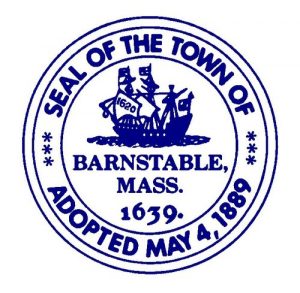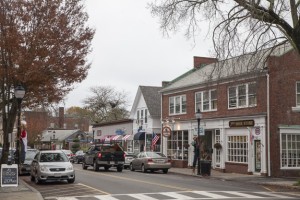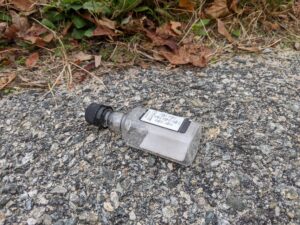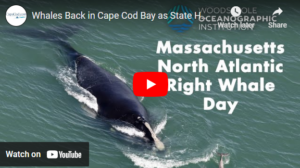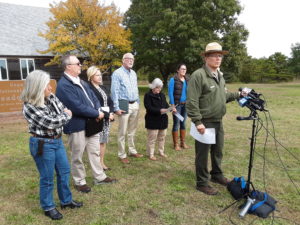 WELLFLEET – There is no “silver bullet” to ensuring safety from white sharks on the Outer Cape, according to the just released report from the six towns, along with the Cape Cod National Seashore and the Atlantic White Shark Conservancy.
WELLFLEET – There is no “silver bullet” to ensuring safety from white sharks on the Outer Cape, according to the just released report from the six towns, along with the Cape Cod National Seashore and the Atlantic White Shark Conservancy.
The study, which cost around $50,000, was conducted by the Woods Hole Group and analyzed 27 shark mitigation strategies.
The goal of the report was to provide a comprehensive and consolidated analysis of the shark mitigation technologies currently available, along with strategies proposed to increase public safety and awareness.
Officials gathered at the National Seashore offices at Marconi Beach in Wellfleet Wednesday to discuss the report.
“There is no one solution that is going to allow for people to be safe should they choose to enter the water,” said Brian Carlstrom, the superintendent of the Cape Cod National Seashore. “There isn’t a silver bullet. There isn’t an aha moment in this report. It is a really good baseline and synthesis of information to then base future decisions on, but there is no aha moment.”
The mitigation strategies in the report were divided into technology-based, barrier-based and biological-based categories.
Techonology-based strategies included acoustic and satellite tagging, visual detection from planes, helicopters, towers, balloons and drones, acoustic detection from sonar buoys, magnetic and adaptive camouflage.
Barrier-based alternatives included flexible exclusion, rigid exclusion, semi-rigid exclusion, bubble curtains, live kelp forests, simulated kelp barrier, electrical deterrents, electromagnetic deterrents and acoustic barriers.
Carlstrom said barrier technology that has been successful in other parts of the world are not feasible for Cape Cod.
“We essentially have 40 miles of open-sand beach with a really dynamic shoreline, with high energy waves and shifting bar systems that are moving around constantly,” Carlstrom said. “Trying to anchor anything down there that would be reliable is highly unfeasible.”
Barriers would also result in a lot of bycatch and unintended consequences to other marine organisms.
Bilogical-based strategies studied include (smart) drum lines, cull nets, seal contraception, seal culling, indigenous harvest, electric shock, scent-smell, and modifying recreational behavior.
Assessments of shark mitigation alternatives and technologies have been conducted in other areas around the world, but not within the context of the unique coastal environment of the Outer Cape. The study includes a summary of baseline environmental and meteorological conditions characteristic of the Outer Cape beaches and nearshore areas.
A summary of the report from the Woods Hole Group emphasizes that there is no single alternative or group of alternatives that can guarantee the safety of 100 percent of individuals who choose to enter the water.
Beachgoers should also acknowledge that different behaviors pose different levels of risk, including wading, swimming, and surfing. The study encourages following Shark Smart Behaviors.
Carlstrom said shark smart principles are located up and down the town and national seashore beaches.
“It is so critical and so important for people to realize that if they are going to get in the water they are assuming risk,” Carlstrom said.
Carlstrom said the report will inform the baseline for future management decisions.
“It is going to take a lot more work with the Seashore, the towns, the state, and other federal agencies to determine what solutions we can continue to implement,” he said.
Shark smart education and messaging will continue.
“We are going to be very aggressive with that and we want to keep people coming here to enjoy it as best they can,” Carlstrom said.
The study came on the heels of two shark attacks off Outer Cape beaches late last summer. In August, a New York man was attacked off Truro and recovered. In September, Arthur Medici, of Revere, was fatally attacked off Wellfleet.
Truro Town Administrator Rae Ann Palmer said it is import to make decisions on scientific-based research.
“We wanted to be sure what options and alternatives would be suitable for our Outer Cape beaches and it was really important to us to make a sound decision that would both protect the environment and the people recreating in the ocean,” Palmer said.
Palmer said decisions would need to protect public safety and the dollars of taxpayers.
“If we are going to do something it is really important that we know it is going to work,” she said. “If we are going to invest a lot of money into it then we have to be sure it is going to work.”
Wellfleet Town Administrator Daniel Hoort said the Outer Cape community and the town need decide what steps to take next.
We know that you can prevent an interaction with a shark by modifying your behavior when you go in the water. We know that can be effective,” Hoort said.
Hoort said there may not be any options worth putting into the water and making people think they are safer.
“We don’t have that magic answer,” he said. “We know you can stay out of the water and be safe.”
Wellfleet Board of Selectmen Vice Chair Kathleen Bacon said the town was hit hard after the fatal attack last year, but it resulted in increased vigilance in regards to recreating in the water.
The town took steps this summer to increase lifeguard patrols, installed higher lifeguard stands to help see the sharks. The State Police also provided support with flyovers and reported shark sightings.
“We have to modify our behavior with regard to how we recreate in the water, and I think Wellfleet did that very successful this year,” Bacon said. “Going forward I think that is what we will continue to do.”
In 2012, the Cape Cod National Seashore, Outer Cape towns, the Atlantic White Shark Conservancy and the Massachusetts Division of Marine Fisheries created a regional shark working group which has been committed to educating the public about recreating as safely as possible in local waters.
The goal of the regional shark working group, which includes public safety officials, has been to learn as much as possible about how to recreate safely and to share that information with the public.
The group has developed brochures, signage, the Sharktivity app, a public safety video, held press conferences, panels, and public forums. It also initiated the Stop the Bleed training and the Stop the Bleed kits found at beaches.
It also developed the idea for the study just released.
“It’s a path forward. It opens the door,” said Leslie Reynolds, the Chief Ranger for the Cape Cod National Seashore. “It’s a platform for the community of Cape Cod to come together and move forward and analyze all the mitigations.”
Atlantic White Shark Conservancy Founder and CEO Cynthia Wigren said the report is a significant document because the strategies were analyzed in respect to the unique local environment.
“It can be used not only on the Cape, but across the coast of Massachusetts,” Wigren said.
She said the conservancy is a major funder of white shark research and it plans to continue to invest in that research to learn more about the apex predators and share that information.
Working with Dr. Greg Skomal, a senior biologist with the Division of Marine Fisheries, the Conservancy has helped to tag more than 100 sharks off the Cape over the last several years. A five-year white shark population study concluded last year and researchers are continuing to analyze that data.
This season they began new research on the predatory behavior of white sharks. Skomal tagged 37 sharks off the Cape this year, which is a new record. Five of those sharks were tagged in Cape Cod Bay, a new research area this year for the team.
The increased shark activity can be tied to the high seal population. More than 50,000 seals populate the shores off the coast of the Cape.
“The distinction on Cape Cod from other areas around the world is the recreation here developed in absence of the sharks and seals,” Carlstrom said. “And now we have the sharks and seals back.”
A mitigation strategy of seal contraception is not intriguing to Carlstrom.
“It is very labor intensive and hasn’t been proved to be effective anywhere else,” he said.
Research will continue on the feasibility of emerging technologies into the future.
“When we can show that it is going to be a responsible allocation of very limited tax dollars we will pursue it,” Carlstrom said. “But we are not quite there yet.”
Hoort said Wellfleet and the Outer Cape Community will continue to emphasize how to respond to an attack, and how beachgoers can avoid an attack.
“We are still working on cellphone service coverage, which is very weak along our beaches,” Hoort said. “But as a rescue operation we have really upped our game as what we are going to be able to do if, God forbid, somebody is attacked again.”
Hoort said the region could take a short-term economic impact, but the jury is still out on whether or not shark activity has impacted the 2019 tourist season.
Carlstrom said visitors to National Seashore beaches this year were similar to the last several years.
“Only about 10 percent of those people actually get in the water,” he said.
Carlstrom said that, despite the attacks last year, one of the most popular questions at the visitor’s center this year was ‘where can I go to see the sharks.’”
Controversial Barnstable County Commissioner Ron Beaty is questioning the report and released a statement Wednesday.
“From my perspective, the highly questionable Great White Shark Mitigation Study and Report recently issued by the Woods Hole Group is essentially a fraud that has been perpetuated upon the public, a waste of public funds, and a failure by our political leaders to properly deliver concrete solutions for the residents of Cape Cod.”
“With or without the help of our lackluster State Legislators, public safety demands that tangible efforts be implemented prior to the 2020 Summer Tourism Season!”
“Unlike politicians like State Senator Julian Cyr and State Representative Sarah Peake among others, I stand ready to forthrightly assist all persons and groups who wish to take positive action at mitigating our Great White Shark Problem and seal overpopulation dilemma!”
In 2017, Beaty proposed culling great white sharks. The proposal, which has been utilized in countries like Australia and South Africa, would place baited drum lines off popular Cape Cod beaches with hooks to catch great whites. Large sharks found hooked and alive would then be shot and discarded at sea.
Officials from the towns, National Seashore, Conservancy and Woods Hole Group will host a public meeting Thursday, October 17 at Nauset Public High School to present the report. The meeting begins at 6 p.m. and guests will be able to comment or ask questions.






